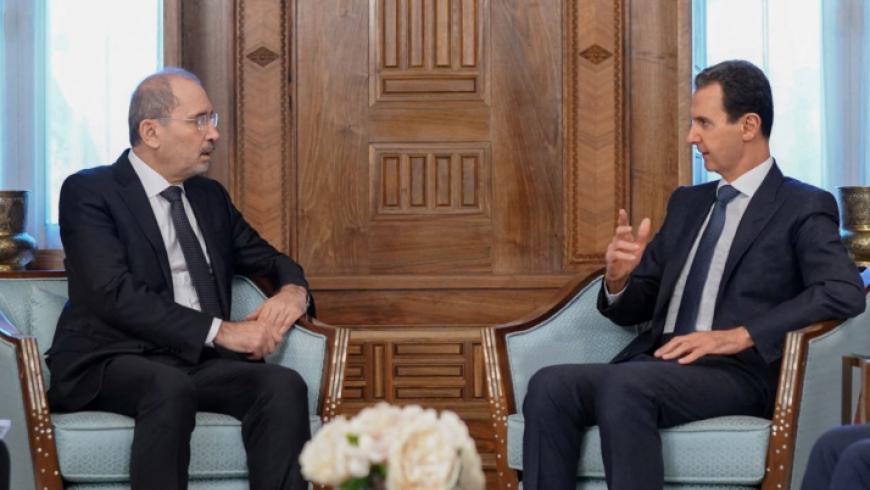An Arab diplomatic source disclosed to Syria TV that several Arab countries, which initially rushed to normalize relations with the Assad regime, have gradually curtailed their efforts at the political and economic levels. However, they have maintained lines of security and intelligence communication.
The source cited several reasons behind this change in policy, with the primary factor being the strong intervention of the United States of America. The U.S. has taken measures to limit this “free” engagement with the Syrian regime and has withheld financial assistance to it.
During a visit to Damascus and a meeting with Assad and regime officials, Jordanian Foreign Minister Ayman Safadi emphasized that the return of refugees is contingent upon receiving necessary guarantees from the Syrian regime, along with essential funding. However, the demand to lift sanctions by the United States has been firmly rejected, further complicating the situation.
Jordanian-Syrian Meeting Includes Military and Intelligence to Combat Drugs
The source also revealed that the American stance towards Assad is directly linked to the ongoing U.S.-Iranian negotiations on the nuclear issue, which were occurring in the Sultanate of Oman. Unfortunately, progress in these negotiations stalled due to conflicting opinions within the U.S. administration, as well as opposition from major parties in the Senate and the House of Representatives.
Moreover, part of the U.S. pressure on Arab countries is attributed to the ongoing pressure on the Russian side amid the escalating Ukrainian war and the Moscow-led actions in the Middle East and Africa.
Overall, the situation has become increasingly complex and interconnected, with international dynamics playing a significant role in influencing the policies and decisions of Arab countries towards the Assad regime.
Assad does not change
In related context, the Arab diplomatic source reveals that there are several reasons behind Arab countries’ decision to freeze all political and economic interactions with the Assad regime. One crucial factor is the alarming presence of drug trafficking in Syria. Drugs are being smuggled through various routes, including Jordan, Lebanon, and even via the Red Sea from countries like Sudan, with active gangs involved in this illicit trade, smuggling drugs into Saudi cities.
The regime had promised Saudi Arabia and other Gulf countries to halt the flow of drugs and shut down Captagon factories in exchange for economic and development programs that would compensate for the financial losses incurred from drug money, which finances military divisions and militias, specifically the Fourth Division.
Additionally, the regime has started to evade its commitments to humanitarian entitlements, particularly concerning Syrian and Arab political prisoners and human rights activists. The regime was required to provide information about their fate but has been evasive in its responses.
Furthermore, the regime has failed to initiate any steps related to the promised dialogues with opposition figures regarding the future of political participation and power transfer to a future government with the involvement of national representatives, despite claiming readiness for such discussions.
The source believes that part of the problem lies in the regime’s lack of seriousness in dismantling checkpoints, camps, and positions belonging to Hezbollah, the Iranian Revolutionary Guards, and other militias. The regime’s actions seem more like a repositioning tactic to improve its image with Arab countries and to showcase its influence on the ground.
The delayed reopening of the Saudi embassy in Syria is attributed to the regime’s reneging on its commitment to stop selling real estate to Iranian, Lebanese, Iraqi, and Iranian businessmen.
On the other hand, a Western diplomatic source indicates that the Arab countries delay in engaging with Damascus, either due to unresolved issues or American pressure, has prompted Russia to intervene and attempt to rearrange the relationship between the two sides. Russian President Vladimir Putin is expected to send officials, including the Special Envoy for the Middle East, Mikhail Bogdanov, to Damascus to activate the agreements made between Arab countries and Syria. Moscow may also make contacts with Iranian officials and Hezbollah to facilitate the normalization process between Damascus and Gulf capitals.
According to information, Moscow has sensed an intention among Gulf countries to halt the aid package for various reasons, including the Caesar sanctions, Assad’s failure to fulfill commitments made during the Jeddah summit, and the setting of a time limit by Saudi Arabia and other countries for the continuation of their contacts with the regime, possibly until the end of the year.
This article was translated and edited by The Syrian Observer. The Syrian Observer has not verified the content of this story. Responsibility for the information and views set out in this article lies entirely with the author.


